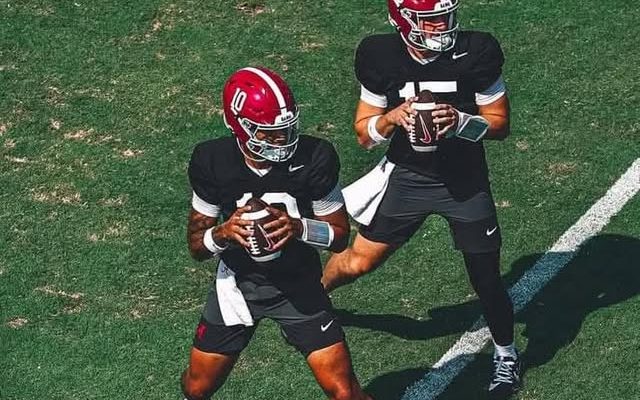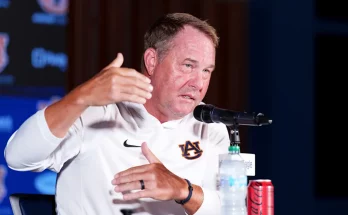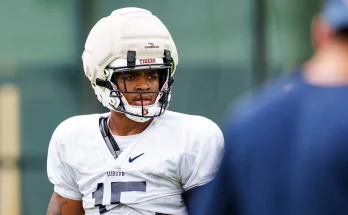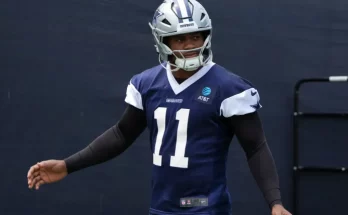The Alabama Crimson Tide’s quarterback battle is reaching a pivotal point in fall camp, and the buzz around Tuscaloosa suggests that the decision on who will lead the offense in 2025 is drawing closer by the day. Head coach Kalen DeBoer, entering his first season at the helm of college football’s most storied program in the modern era, offered his most optimistic assessment yet of his quarterbacks’ performance following a recent practice session. His words carried both encouragement and a sense of anticipation for what’s to come, particularly with the second scrimmage looming — the point at which the starting quarterback is expected to be named.
DeBoer’s praise was straightforward but telling: “No picks today and a few touchdown passes between all three of them,” he said after practice. In an era where quarterback efficiency can make or break a season, those few words spoke volumes about how seriously the contenders are taking the responsibility of protecting the football. A turnover-free day in practice might seem like a small detail to the casual observer, but in the crucible of Alabama football, where competition is fierce and expectations are sky-high, it can be the difference between winning and losing the job. DeBoer emphasized that the completion percentage throughout camp has been exactly where the staff wants it to be — above 65 percent — a mark that not only suggests accuracy but also good decision-making in reading defenses and executing plays.
That completion percentage benchmark isn’t arbitrary. In DeBoer’s offensive philosophy, efficiency through the air is critical. While the Crimson Tide offense has traditionally been balanced, leaning on physical dominance in the run game, DeBoer’s track record at Washington and Fresno State shows he values quarterbacks who can consistently deliver high-percentage throws, keep the chains moving, and avoid putting the defense in difficult positions with turnovers. A quarterback who can maintain a 65 percent completion rate in practice, especially against a defense as talented and complex as Alabama’s, is demonstrating that he can manage the game at an elite level.
The praise was evenly distributed among the three primary contenders, signaling that the competition is still fierce and that no one has run away with the job just yet. In such battles, perception matters. When a head coach publicly notes that no interceptions were thrown, it sends a message not only to the players but to the entire program: discipline and ball security are non-negotiable. That kind of message is especially important for a new head coach like DeBoer, who is still building his cultural foundation in Tuscaloosa after taking over from Nick Saban.
The decision timeline has been a consistent theme throughout camp. DeBoer has been transparent about his plan to name a starter after the second scrimmage, and that still appears to be the case. “I feel like we’re getting closer,” he said, hinting that the evaluation process is moving toward its natural conclusion. For the quarterbacks involved, that second scrimmage becomes the equivalent of a final exam — one last opportunity to show mastery of the offense, poise under simulated game pressure, and leadership that inspires confidence from teammates.
Behind the scenes, the competition is likely as intense as any in recent Alabama history. Every rep in practice is charted, every decision is scrutinized on film, and every sign of progress or regression can shift the perception of who is ready to take the reins. While DeBoer did not single out individual performances, the tone of his comments suggests that all three quarterbacks are rising to the challenge rather than crumbling under the weight of expectation. That resilience bodes well for the team, regardless of who ultimately wins the starting job, because depth at the position has become increasingly important in modern college football.
One underappreciated aspect of DeBoer’s comments is what they reveal about the mental side of quarterbacking. Going an entire practice without throwing an interception requires not only physical precision but also discipline in decision-making. Quarterbacks must recognize when to check the ball down, when to throw it away, and when to take a calculated risk. That situational awareness is often what separates good quarterbacks from great ones, especially in the SEC, where defensive backs are quick, schemes are sophisticated, and mistakes are punished swiftly.
DeBoer’s offensive background also plays a role in how the competition is unfolding. Known for his creative play designs and ability to maximize quarterback strengths, he is likely tailoring the playbook to evaluate specific skills in each contender. One quarterback might excel at throwing deep off play-action, another at threading quick slants into tight coverage, and another at extending plays with mobility. The second scrimmage will be a proving ground for showing not only raw talent but also adaptability — the ability to execute the right play at the right time in a game-like environment.
The Crimson Tide faithful, of course, are hanging on every update, eager to see who will be the face of the offense in 2025. Alabama’s history under center is a rich one, from legends like Joe Namath and Ken Stabler to modern stars like Tua Tagovailoa, Mac Jones, and Bryce Young. The next starting quarterback will inherit both the burden and the privilege of that legacy, stepping into a role that demands not only statistical production but also leadership in the locker room and composure under national scrutiny.
For DeBoer, the decision is about much more than arm strength or highlight throws. It’s about choosing the player who can best execute the offense, rally the team in difficult moments, and give Alabama the best chance to compete for championships. That’s why he has stuck to his plan, resisting the temptation to rush the decision even as the media and fans speculate. A rushed choice could lead to instability; a carefully considered one could set the tone for a successful season.
The second scrimmage will almost certainly feature an expanded set of challenges for the quarterbacks — more exotic blitz packages, more situational drills, and possibly even periods designed to simulate hostile crowd noise or sudden momentum swings. DeBoer and his staff will be watching to see how each quarterback handles adversity, because it’s one thing to shine in routine drills and another to deliver when everything is on the line.
The other factor in this decision is the supporting cast. Alabama’s offensive line, receivers, and running backs will all influence how comfortable a quarterback feels in the pocket and how much risk he’s willing to take. A quarterback who trusts his receivers to win one-on-one matchups or his line to pick up a blitz will play with more confidence. That’s why the quarterback battle is as much about chemistry as it is about mechanics, and why DeBoer’s evaluation process includes both statistical analysis and intangible qualities like leadership and rapport.
As the days tick down toward that second scrimmage, the atmosphere in Tuscaloosa will grow more charged. The players know what’s at stake, and so does the coaching staff. By keeping the message consistent — protect the football, complete passes at a high rate, and show command of the offense — DeBoer has given his quarterbacks a clear road map to winning the job. The fact that all three contenders appear to be hitting those marks makes the competition not only more compelling but also more encouraging for Alabama’s chances this season.
If the next scrimmage provides the clarity DeBoer anticipates, Alabama will soon have its starting quarterback in place, ready to lead the team into the season opener. Whoever earns that honor will have passed one of the most intense position battles in college football and will carry the responsibility of keeping Alabama in the national championship conversation. For now, though, the story remains one of steady progress, disciplined execution, and a head coach who knows exactly what he’s looking for.
It’s the kind of preseason narrative that fuels both excitement and confidence among the fan base — excitement because the competition has been close and the talent level is high, and confidence because the process has been deliberate and grounded in performance, not hype. In Tuscaloosa, where the standard is nothing short of excellence, that’s exactly the kind of foundation a new coach wants to lay before the first whistle blows in September.



